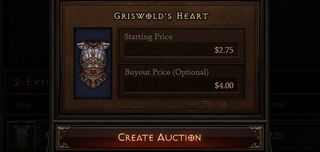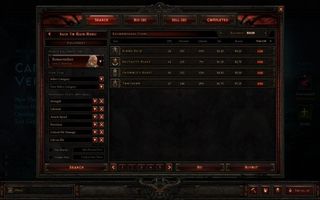Diablo 3 will let players buy and sell items for real money

This is going to be interesting. On Tuesday, Blizzard invited us to their headquarters in Irvine, California to announce that Diablo 3 will feature an auction house that lets players buy and sell in-game items for real money.
At the same event, they revealed that Diablo 3 requires a constant internet connection to play - there's no offline mode at all.
This is not the same as the microtransaction model we've seen in other games: Blizzard themselves aren't selling any in-game items. The auction house will be entirely player driven: everything you see there was found by someone, and most of the money spent to buy it goes to the player who found or crafted it.
Read on for more details, and Blizzard's justifications for it.

Blizzard's cut
It will cost a small flat rate to list an item on the auction house, and Blizzard will take another flat rate fee when the sale is completed. Both figures will be in real money, but they're not proportional to the value of the item. Blizzard say they wanted to stay away from taking a percentage cut.
"Percentages really incentivise us to manipulate the system," says lead designer Jay Wilson, "and we don't even want the incentive to do that, much less actually doing it."
Despite the flat fees they take, Blizzard don't expect it to be a money spinner for them. "We expect it'll break even," lead designer Jay Wilson says.
The biggest gaming news, reviews and hardware deals
Keep up to date with the most important stories and the best deals, as picked by the PC Gamer team.
"We talked about this as a service we wanted to provide players, and not primarily as a financial model... we don't know if it will make us money. It would be nice if it did, but as long as we don't lose money, that's really what we care about: that we provide the players with a great experience that doesn't put us out of business."
I asked if they'd still do it even if they couldn't take a cut of the sales. "Absolutely," says Jay.
Value to the player
"We think it's really going to add a lot of depth to the game," says executive producer Rob Pardo. "If I have more money than time I can purchase items, or if I'm leet in the game I can get benefits out of it."
"The players really want it. This is something that we know people are going to do either way. We can provide them a really safe, awesome, fun experience, or they'll find ways of doing it elsewhere."
It's true that some players bought and sold in-game items for both the previous Diablo games through unauthorised third parties. I'm not convinced that means the player base at large want it to be a part of the game.
You won't be able to buy a game-endingly good sword at level 1, since items have minimum level requirements. But the real-world value of 100,000 gold for a level 40 character is bound to be a lot less than it's worth to a level 1.

Other auction houses
No-one has to use the real-money auction house of course. "If no-one wants to do it," Rob says, "there'll be no trading whatsoever." Diablo 3 will have a second, separate auction house that operates only on in-game gold. It won't cost any real money to list your items there. But since gold itself can be bought and sold on the real money auction house, it won't be entirely isolated from its effects.
There'll be a separate auction house for each currency Blizzard can accept: UK players won't see items listed by their US friends. Within regions, players can choose to switch to a different auction house, but there's a conversion cost for buying items from the auction house that isn't in your native currency. So European players can switch between the UK pounds sterling auction house and the Euro one. But they can't switch to the US action house, because the US is a different region.
Cashing out
Each week players will receive a number of 'free listings' for the real money auction house, letting them put items up for sale without having to pay real money. Even if you haven't entered your credit card details, you can earn real money from items this way.
Cashing out will be dealt with by a third party Blizzard aren't ready to announce, and that party will charge a fee for the withdrawal. If you don't withdraw your funds, you can spend them on other items in the auction house, or to buy anything else from the Blizzard store - which carries digital versions of all their major games, and in-game pets for World of Warcraft.
What about those other Blizzard games? "I think this works particularly well within the Diablo system." says Rob. "99.9% of the items will not be soulbound in any way." In World of Warcraft, soulbinding prevents you from trading many items to other players. "I really don't see us doing it for WoW ever."

Gold farming
The obvious question, then, is how this will affect gold farming: people who repeatedly play the most profitable parts of a game to sell the in-game proceeds for real money. They already plague World of Warcraft without a legal way to sell the proceeds - isn't this just encouraging them? Rob answers with a question.
"What's the difference between a player that plays the game a lot and a gold farmer? They're really doing the same activity. If you are doing an activity where all you're trying to do is generate items for the auction house, you're not making someone else's game experience poorer. If anything you're making the game better, because you're generating items for the auction house that people want to purchase."
Since no-one can join your game of Diablo 3 without your permission, grinding gold farmers won't be as intrusive as in the public world of WoW. Their effect on the economy, though, is hard to predict.
The cheapening
I have a different concern. To me, the pleasure of Diablo is finding these items - that nerdy thrill of seeing some gold letters amongst the loot that twirls out of a dying boss. Better still, of finding a randomly generated weapon whose stats put my current kit to shame.
I don't mind that I'll be able to sell that for real money in Diablo 3, but I mind that I could have just bought it in the first place. Not for some prohibitively huge some of in-game gold, but the spare change in my wallet.
I asked Jay if they saw this as a problem. "That's not anything different than Diablo 2," he says. "The best items that came through that game did come through trading, and came through interacting with other players."
True for some, I guess, but one of the reasons they're doing this is that there weren't convenient ways to find and trade items in the previous Diablo games, and no safe way to do so for real money. By making it easy, legal and searchable, Blizzard have put the boring option temptingly close to the long and rewarding search for great loot. I don't have to take it, of course, but I worry the search will seem that much longer and less rewarding with a Buy It Now button nestled right next to it.
Most Popular







